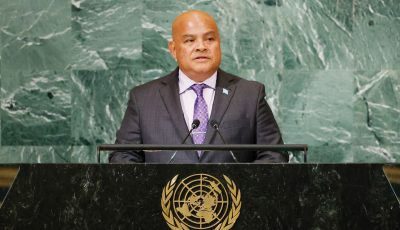Business as usual despite PH ban

Marie Lozada, who works as a salesperson in Pohnpei, said it is work as usual for Filipino workers in the Federated States of Micronesia, despite a Philippine ban on the deployment of Filipino workers to FSM. (Bea Cabrera)
POHNPEI, Federated States of Micronesia—Despite a recent ban on the deployment of Filipino workers to the Federated States of Micronesia, many of the Filipino workers who are already there are unperturbed by this development and even swore that they haven’t heard of any abuses done to their countrymen on the islands.
Marie Lozada, who works as a salesperson in Kolonia, Pohnpei, said that she has heard the news about the ban but is not affected by it.
“It is work as usual here. Nobody is being sent home and no one is voluntarily going home because of the ban,” she said.
The Philippine government, which relies heavily on the remittances sent by its overseas workers, controls where these workers go. Last Aug. 17, the Philippine Overseas Employment Administration banned deploying Filipino workers to FSM in response to reports of abuse and maltreatment of foreign workers there.
That report about alleged abuses by employers is news to Lozada. “Personally, I have not experienced any maltreatment from my employer nor heard about other Filipinos being maltreated by their employers in Pohnpei.”
“In Pohnpei, many Filipinos work in the stores, offices, and the hospital. I plan to finish my contract, which will end early next year, and move to another job in a new country—not because of the ban but by personal choice,” Lozada added.
The minimum wage for private sector workers in Pohnpei is $1.75 per hour and one only needs a work permit, which FSM immigration requires in specific job categories.
There are approximately 2,000 Filipino workers in FSM, which is made up of four island states: Pohnpei, Kosrae, Chuuk, and Yap.
The POEA, which imposed the ban, only allows the deployment of Filipino workers to countries that have a legal framework that protects these workers’ rights.
The POEA resolution on the ban was based on reports that date back to June of last year of maltreatment and abuses of Filipino workers that led to the POEA blacklisting the Chuuk State Hospital. It also stated that the Philippine Department of Foreign Affairs recommends the ban until FSM settles the unresolved cases and improve the working conditions of Filipino workers.
The ban took effect on Sept. 7, 2018, after the FSM Consulate received the diplomatic note that confirmed the ban. According to an article from The Kaselehlie Press dated Sept. 17, 2018, FSM is at a loss as to why the whole country was banned because no report of abuse or maltreatment has been made at the Chuuk State Hospital.
The report further stated that FSM Department of Foreign Affairs Secretary Lorrin Robert said that the FSM Department of Justice has not received complaints from Filipino workers at the national level.
Robert added that he has written to each of the four state governors to see if any reports have been made at the state level. Currently, FSM is waiting for the reports of abuse and maltreatment of Filipino workers at the state levels before it comes up with a plan on how to resolve the situation with the Philippines.
The United Filipino Community of Pohnpei also issued a statement that, as far as they are concerned, they have not received any reports of abuse and maltreatment of Filipino workers. In fact, they have asked the Pohnpei Gov. Marcelo Peterson and FSM President Peter Christian to help Filipino workers who may need assistance.



























